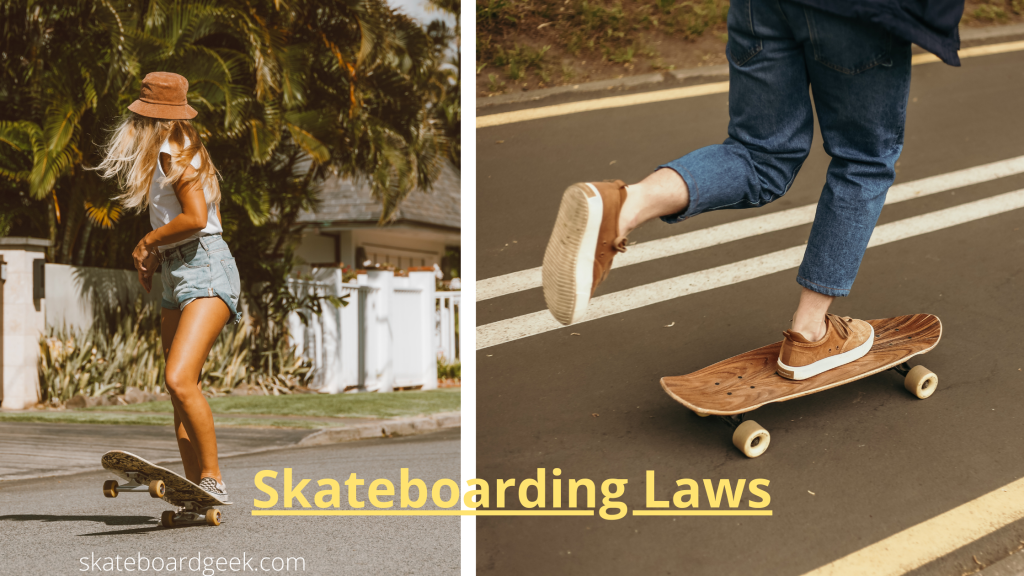Skateboarding may be a fun and exhilarating sport, but it’s not all sunshine and rainbows – especially when it comes to the law. From bans on skateboarding in public places to strict regulations on gear and apparel, navigating the legal landscape of skateboarding can be a real headache.
But fear not, we’ve got you covered with all the essential skateboarding laws and rules that every skater should know. We’ll break down the basics of skateboarding legality, from the most common restrictions to the most hidden regulations.
So, whether you are a beginner looking for safe spots to skate or just curious about the law and regulations, grab your deck, slap on some pads, and let’s dive into the wild world of skateboarding laws – because knowledge is power, and we’re all about staying on the right side of the law (well, mostly).
Contents
Skateboarding Laws and Restrictions
Skateboarding is a very popular sport enjoyed by people of all ages, but the law can be very slippery. From states that allow skateboarding in public parks to where skateboarding is banned in certain places. Make sure you are up to date with your local skateboarding laws and get a copy of the Skateboard Law Book.
In general, skateboarding is illegal in public places like parks, sidewalks, and streets. The reason for this is that skateboarding can damage property and be a nuisance to pedestrians.
However, there are some exceptions to this rule. For example, in Chicago, Illinois, skateboarding is allowed on designated paths in certain parks. And in many cities, skateboarding is allowed in skate parks, which are specially designed areas for skateboarding.
So if you are looking for places to ride a skateboard, your best bet is to find a skate park in your area. Just be sure to check the rules before you start skating. We recommend asking an official authority figure in the area whether you can skate in the area or not.
Is Street Skateboarding Illegal?

This is due to the fact that skateboarding can be dangerous for pedestrians and can damage property.
However, there may be exceptions to these rules in certain areas. For example, in Georgia, Florida, and Illinois, street skateboarding is allowed in designated areas.
Also, read about electric skateboards.
Why is Skateboarding not Allowed in Public Places?
The primary reason that skateboarding is not allowed in many public places is that it can be a nuisance and cause damage to property. Skateboarding can also be dangerous for pedestrians, who may get injured if they are hit by a skateboarder or if they trip over an obstacle created by skateboarders.
Additionally, some cities may view skateboarding as a form of loitering or trespassing, which could negatively impact the public image of skateboarders.
Despite these concerns, many cities have started to embrace skateboarding and work to create safe spaces for skaters.
Rather than carrying your board in hand, it will be better and look cool to carry a skateboard on a backpack.
Which States Allow Skateboarding in the United States?
There is no one-size-fits-all answer to this question, as the laws surrounding skateboarding vary from state to state. Some states that are known for having particularly permissive laws around skateboarding include California, Oregon, Illinois, Georgia, and Colorado.
But regardless of where you live, it is always important to stay informed about the local laws surrounding skateboarding and to practice safe and responsible skating at all times.
Skateboarding in Georgia
Skateboarding is legal in Georgia. However, as with all states, there may be some local laws or ordinances in place that regulate skateboarding. So if you are planning on skateboarding in Georgia, it is best to consult with local authorities or check the relevant laws in your city or municipality to make sure that you are in compliance.
Skateboarding in California
Generally, skateboarding is legal in California. Many cities and municipalities in California have designated skate parks where skaters can practice their hobby freely and safely.
Additionally, there are many public spaces around the state where skateboarding is allowed, such as sidewalks, streets, and parks.
Skateboarding in Florida
While skateboarding is generally legal in Florida, there are some local laws and ordinances that may restrict or prohibit it in certain areas. For instance, some cities in Florida have banned skateboarding on public sidewalks.
Additionally, Florida’s Department of Transportation has banned skateboarding on all state highways, so you should avoid skateboarding on highways in the state.
Skateboarding in Illinois
If you are a skateboarder, then you know that Illinois is one of the most skate-friendly states in the country. The city of Chicago has dozens of well-known spots for street skating, and there are plenty of smaller towns that have great parks and hills for cruising. But just because skating is popular in Illinois doesn’t mean it’s legal everywhere.
In 2014, Governor Quinn signed into law a bill that made skateboarding and inline skating legal on public sidewalks in Illinois. This makes our state one of just 12 in the country where skateboarding is explicitly allowed by law.
But despite this progress, there are still some restrictions on skateboarding in Illinois, so it’s important to know your rights and responsibilities when skating.
Which States do not Allow Skateboarding in the United States?
Some states that are known for having particularly restrictive laws around skateboarding include New York, Alabama, and Florida.
Now that you know a little bit more about the laws surrounding skateboarding, get out there and enjoy your favorite hobby. Just be sure to stay safe and obey the law!
Safe Places to Ride a Skateboard
Skaters mostly ride a board wherever they feel like but it is dangerous and can end up in severe injuries. It is necessary to know which places are safe to ride and make sure to inspect the surface before rolling the board.
- Skateboard on a smooth and even surface, without debris and cracks.
- The surface should be clean and dry, do not skate on a wet surface.
- Try learning new tricks in a less busy skate park.
- Avoid skateboarding on roads with lots of traffic.
- Read all the rules and regulations before entering a skate park.
- Do not wear headphones while skateboarding
Conclusion
Whether you are a seasoned skateboarder or just starting out, it is important to stay informed about the skateboarding laws. In states like California, Oregon, Georgia, and Colorado, skateboarding is generally legal and there are many public spaces where skaters can practice their hobby safely and responsibly.
However, in states like New York, Alabama, and Florida, skateboarding may be restricted or prohibited in certain areas, so it is important to research and comply with local laws.
So if you are a skater living in or visiting one of these states, be sure to check the relevant laws and do your best to stay safe while enjoying your favorite hobby!
Frequently Asked Questions
What states ban skateboarding?
As of 2025, the states of New York, Alabama, and Florida have all passed laws banning skateboarding on public property. Additionally, Florida’s Department of Transportation has also banned skateboarding on all state highways, so skaters in that state should avoid these areas.
What is illegal skateboarding?
Illegal skateboarding refers to skateboarding in areas where it is not allowed by law. This can include skateboarding on public sidewalks, streets, and parks in states like New York, Alabama, and Florida. Additionally, skateboarding on all state highways is also illegal in Florida.
- Best Electric Skateboard for Big Guys (Heavy Duty E-Boards) - June 3, 2023
- Skateboard Clothing Brands to Make You Stand Out In 2025 - May 31, 2023
- 90s Skateboarding Brands: The Rise and Fall of the Legends - May 28, 2023





![Skateboarding Safety Tips for Beginners and Pros [Safe Ride] skateboarding equipment list and safety tips](https://skateboardgeek.com/wp-content/uploads/2023/05/tips-for-safe-skateboarding-150x150.jpg)




